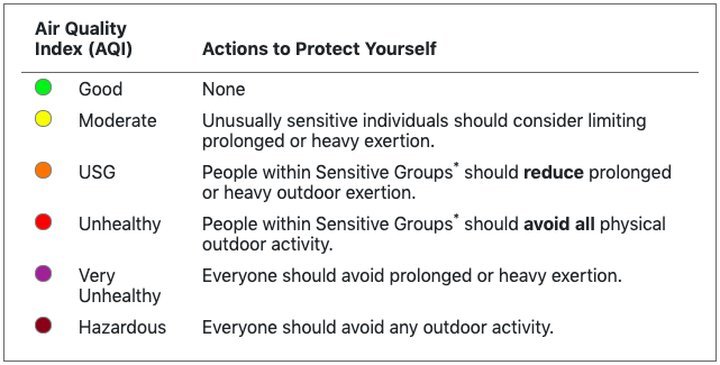Public service announcement from the North Coast Unified Air Quality Management District:
Several fires are impacting our region: Red Salmon Complex, August Complex, Slater Fire, Oak Fire, as well as numerous other fires (BTU/TGU Complex, etc.). USFS Air Resource Advisors (ARAs) are assigned to LRA fires impacting our area, providing daily smoke outlook forecasts that advise these notifications within our jurisdiction. The National Weather Service has issued a Red Flag Warning through noon today.
Continued significant fire growth and smoke production from the Red Salmon Complex and Slater Fire is expected today. Significant offshore smoke from fires in Oregon is making its way along the coast and may mix down depending on conditions. Weather conditions and fire activity will continue to push smoke from the August Complex and Oak Fire to the North impacting the communities in Southern Humboldt and Trinity County.
Communities that are closer to the fires will expect to see elevated smoke levels. Along the coast generally Moderate conditions with periods of Unhealthy for Sensitive Groups is expected depending upon location. While there will be dark visible heavy smoke above, the majority of the smoke is expected to stay aloft.
Humboldt County – Air Quality Advisories were issued today for the communities of Weitchpec, Hoopa, and Garberville, Redway areas.
Fire information can be found at http://inciweb.nwcg.gov/ or https://fire.airnow.gov/. Current weather information can be found at www.wrh.noaa.gov.
- Coastal areas – Widespread haze and smoke aloft, but generally Moderate to Unhealthy for Sensitive Groups.
- Eureka - Moderate to Unhealthy for Sensitive Groups depending on conditions.
- Orleans - Unhealthy for Sensitive Groups with periods of Unhealthy conditions.
- Hoopa & Weitchpec - Unhealthy for Sensitive Groups with periods of Unhealthy conditions.
- Willow Creek - Unhealthy for Sensitive Groups with periods of Unhealthy conditions.
- Garberville & Redway and nearby communities – Unhealthy to Very Unhealthy conditions.
As with all wildfires, ash fallout is possible depending on fire activity and proximity to the fires. Ash fallout information can be found in the Wildfire Smoke Resources section of our webpage at www.ncuaqmd.org.
Health Information for Smoke Impacts
Concentrations of smoke may vary depending upon location, weather, and distance from the fire. Smoke from wildfires and structure fires contain harmful chemicals that can affect your health. Smoke can cause eye and throat irritation, coughing, and difficulty breathing. People who are at greatest risk of experiencing symptoms due to smoke include: those with respiratory disease (such as asthma), those with heart disease, young children, and older adults.
These sensitive populations should stay indoors and avoid prolonged activity. All others should limit prolonged or heavy activity and time spent outdoors. Even healthy adults can be affected by smoke. Seek medical help if you have symptoms that worsen or become severe.
Follow these general precautions to protect your health during a smoke event:If you have lung disease (including asthma) or heart disease, closely monitor your health and contact your doctor if you have symptoms that worsen.
- Minimize or stop outdoor activities, especially exercise.
- Stay indoors with windows and doors closed as much as possible.
- Do not run fans that bring smoky outdoor air inside – examples include swamp coolers, whole-house fans, and fresh air ventilation systems.
- Run your air-conditioner only if it does not bring smoke in from the outdoors. Change the standard air conditioner filter to a medium or high efficiency filter. If available, use the “re-circulate” or “recycle” setting on the unit.
- Do not smoke, fry food, or do other things that will create indoor air pollution.
Consider leaving the area until smoke conditions improve if you have repeated coughing, shortness of breath, difficulty breathing, wheezing, chest tightness or pain, palpitations, nausea, unusual fatigue, lightheadedness.
Updated guidance from the CDC is available on reducing wildfire smoke exposure given COVID-19 considerations: https://www.cdc.gov/disasters/covid-19/reduce_exposure_to_wildfire_smoke_covid-19.html.

CLICK TO MANAGE